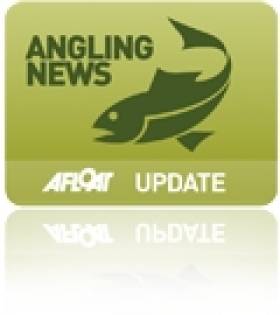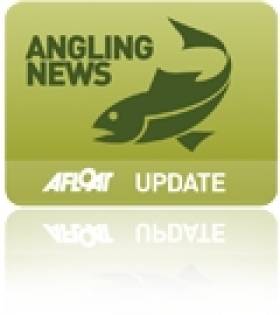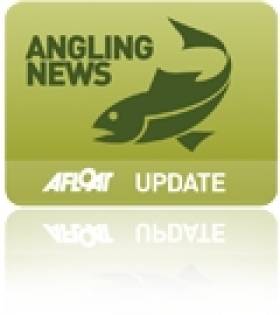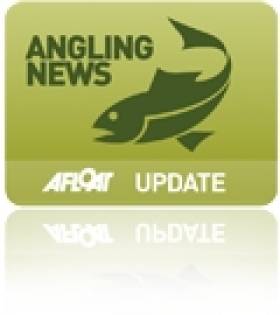Displaying items by tag: Minister of State for Natural Resources
Low Cost Licences To Encourage Angling Tourism Says Minister
#Angling - The Minister of State for Natural Resources has said the unchanged cost of fishing licences this year should encourage angling tourism in Ireland.
Commenting Thursday on his approval of the new regulations and by-laws for Ireland's wild salmon fishery which came into force on 1 January, Minister Fergus O'Dowd said: "Last year I lowered the cost of fishing licences and I have decided to maintain that price cut for 2013.
"I am anxious that lower costs will encourage sales of annual licences and incentivise angling tourists to avail of the Ireland’s first-class angling product."
Last week Afloat.ie reported that the Irish Times' angling correspondent Derek Evans welcomed the regulation changes for the start of this year's salmon season.
In an update to previously reported figures, conservation measures for this year involve the closure of 58 rivers due to a lack of surplus fish, down from 64 closures in 2012, while 62 rivers are open for fishing in what marks a significant rise on last year.
"This will provide opportunities for commercial fishermen and anglers to share this important resource on a sustainable basis," the minister commented.
Additionally, the Wild Salmon and Sea Trout Tagging Scheme regulations are "in essence unchanged" from last year.
Survey to Assess Value of Irish Angling
#ANGLING - Inland Fisheries Ireland (IFI) has appointed Tourism Development International (TDI) to undertake a Socio-Economic Survey of Recreational Angling in Ireland.
The overall objective of the survey, which will run over the course of 2012, is to establish the current volume and value of domestic and overseas recreational angling in the country.
Pike, coarse fish, bass, salmon, sea trout, brown trout and sea anglers will all be invited to participate in what is described as Ireland's most comprehensive angling survey undertaken in decades.
The survey will inform IFI and its tourism partners in relation to the business of angling in Ireland and also enable improved strategic planning and decision-making in terms of product development and marketing.
"Anglers are the key to this survey," commented Minister of State for Natural Resources Fergus O'Dowd. "They know the resource and they understand the importance of sustainability. What anglers contribute to Ireland’s economy is unknown but I am certain that it is significant.
"Angling takes place in every river and lake in Ireland and all around our coastline. There is no town or village in Ireland that doesn’t have anglers."
He added: "It is imperative that the inland fisheries and sea angling resources are managed in the best way possible to ensure enjoyment for our local and visiting anglers, sustainable jobs in rural communities and maximising its potential to add to Ireland’s economy.
"Getting the right information from those most involved will greatly assist in improving the angling product."
The survey comprises two parts: a household survey and a survey of recreational anglers which will commence in April. Anglers will be met at fishing locations throughout Ireland and invited to participate there and then, or later by phone or online. IFI says that every effort will be made to accommodate participation.
- angling
- Inland Fisheries Ireland
- IFI
- Tourism Development International
- TDI
- survey
- SocioEconomic Survey of Recreational Angling in Ireland
- Pike
- Salmon
- Sea Trout
- brown trout
- coarse angling
- sea angling
- tourism
- business
- marketing
- development
- Minister of State for Natural Resources
- Fergus O'Dowd
- sustainability
- inland waterways
- jobs
#ANGLING - Plans to bring forward the estuary draft net season "would have a detrimental effect" on spring salmon stocks, writes Derek Evans in The Irish Times today.
Evans was responding to proposals before Minister of State for Natural Resources Fergus O'Dowd to extend the draft net season from its current start date of 12 May to mid-April.
"At a time when we are beginning to see the benefits of the 2006 drift net closure coming to fruition in terms of salmon returning to our lakes and rivers," he writes, "is it not absolutely unreasonable to even consider such an application?"
He referred to anglers who have "played their part" by sticking to a "suite of regulations" introduced by the State in an effort to conserve river stocks, which include a doubling of the salmon licence fee and an annual bag limit restricted to 10 fish.
Spring salmon angling is also a significant attraction for tourism, he suggests, and any threat could damage that business.
The minister's office has issued a statement saying there no proposal currently under consideration to bring forward the start date.
Openings for New Salmon Season Announced
The Minister of State for Natural Resources yesterday announced more details of river openings for fishing in the New Year due to improvement in the salmon stock.
Minister Conor Lenihan announced that 52 rivers across the country - two more than 2010 - would be opened for fishing. A total of 60 will remain closed due to a lack of surplus, which is 20 fewer than last year.
Among those previously closed that will be reopened for 2011 are the Castletown, the Eske, the Glenamoy, the Kerry Blackwater and the Suir. Additional rivers will be opened on a catch-and-release basis.
The River Liffey will have a special one-time opening for fishing on New Year's Day.
Also announced was a €12 reduction in the cost of one-day angling licences, intended to encourage tourist anglers.
The Irish Times has more details on the salmon river openings and closures HERE.

































































